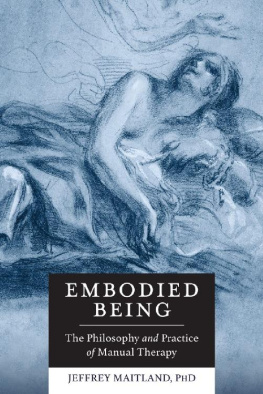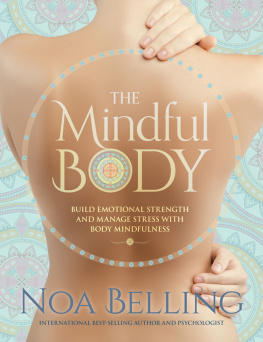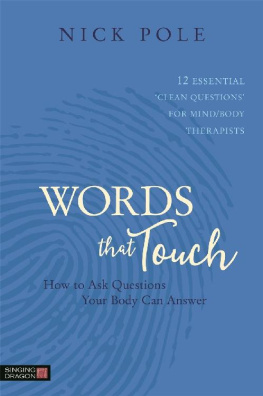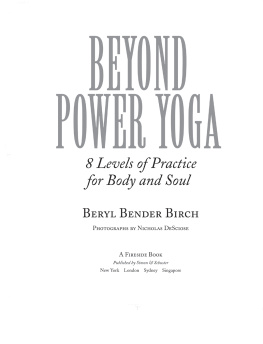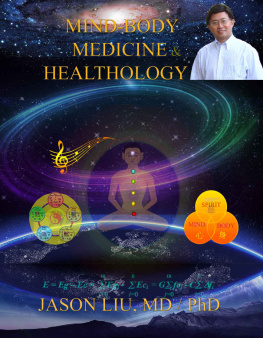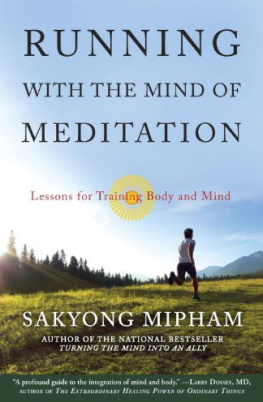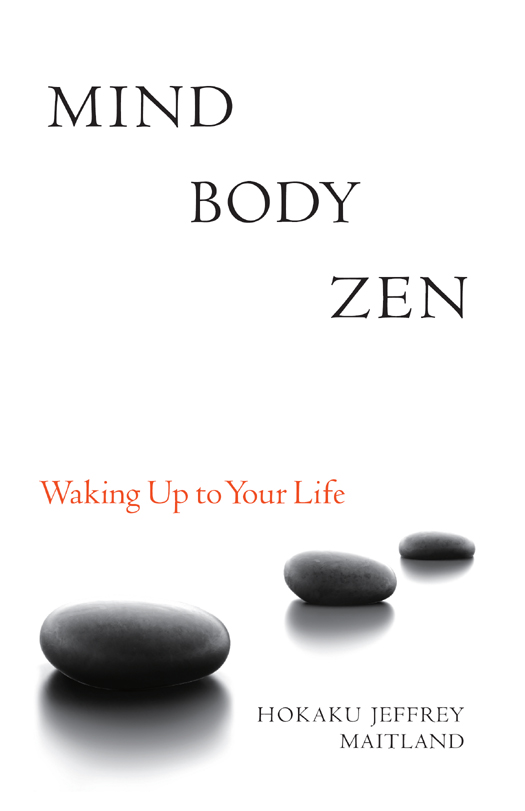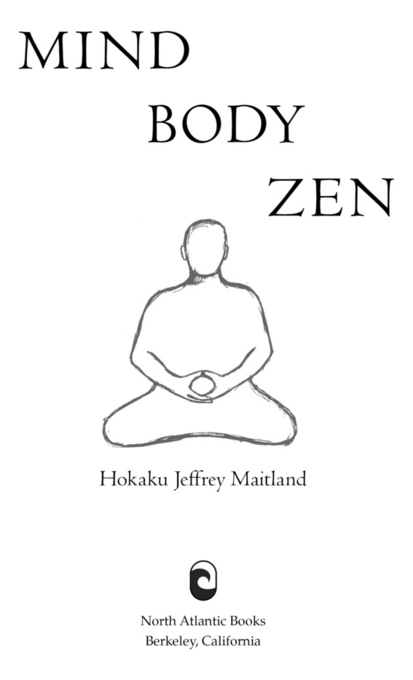Other books by Hokaku Jeffrey Maitland:
Spacious Body: Explorations in Somatic Ontology
Spinal Manipulation Made Simple: A Manual of Soft Tissue Techniques
Copyright 2010 by Hokaku Jeffrey Maitland. All rights reserved. No portion of this book, except for brief review, may be reproduced, stored in a retrieval system, or transmitted in any form or by any meanselectronic, mechanical, photocopying, recording, or otherwisewithout the written permission of the publisher. For information contact North Atlantic Books.
Published by
North Atlantic Books
P.O. Box 12327
Berkeley, California 94712
Cover photo Felix Mckel/istockphoto
Cover design by Brad Greene
Mind Body Zen: Wake Up to Your Life is sponsored by the Society for the Study of Native Arts and Sciences, a nonprofit educational corporation whose goals are to develop an educational and cross-cultural perspective linking various scientific, social, and artistic fields; to nurture a holistic view of arts, sciences, humanities, and healing; and to publish and distribute literature on the relationship of mind, body, and nature.
North Atlantic Books publications are available through most bookstores. For further information, visit our website at www.northatlanticbooks.com or call 800-733-3000.
Library of Congress Cataloging-in-Publication Data
Maitland, Jeffrey, 1943
Mind body Zen : waking up to your life / by Hokaku Jeffrey Maitland.
p. cm.
eISBN: 978-1-58394-471-4
1. Spiritual lifeZen Buddhism. I. Title.
BQ9288.M34 2010
294.3444dc22
2010020599
v3.1
For Lee-Ann and Joshu Sasaki Roshi
Roshi says he is very old,
that his brain is growing moss.
Why is it then
that Spring flowers fall from his eyes
and blue lightning shoots from his mouth?
CONTENTS
PREFACE
Kendo Hal Roth
Professor of philosophy, Brown University
There are a great many books written about Zen. I once attended a meeting of the Association for Asian Studies in which a scholar who writes on Zen gave an entire twenty-minute presentation listing all the books he could find that contained the word Zen in the title. These days the words ubiquity has expanded well beyond books. If you have a product to sellperfume, seaweed, MP3 players, bassinets, diaper stackers, teapots, dog food, shower curtains, or even toilet-paper holders (all listed on Amazon.com)calling it Zen gives the item a certain cache, a certain minimalist aesthetic that Western popular culture has come to associate with the term.
There have been numberless books written that attempt to apply Zen to the problems we face in daily life, everything from motorcycle maintenance to golf to screaming (yes, Amazon lists a DVD entitled Zen Screaming.) But how many of these books have been written by someone who actually practiced Zen, much less had many years of practice with an authentic Zen master? How many are pop-psychology self-help books written by people who have read one of the many tomes of Alan Watts or D. T. Suzuki and then become self-styled experts?
Zen sells in the academic world as well. A Zen scholar once remarked to me, with tongue firmly planted in cheek, that he had put Zen into the title of his book not once but twice, and that hed more than doubled its sales as a result! Indeed, scholarly works on Zen abound these days. Many follow the intellectual pretense of seeing through the rhetoric of Zen from the presumably superior postmodern position of detailing how the various political intrigues and superstitious folk beliefs that have found their way into Zen monasteries over the centuries undermine any claims Zen makes to having genuine epistemological insights. Indeed, debunking Zen has become somewhat of a cottage industry among North American scholars who are hellbent on proving that Zen is just as superstitious and political as the religions they were raised in and subsequently rejected (or accepted, as a few did).
In the latter group are scholars whose hidden religious commitments to one of the Abrahamic traditions and the assertion of an ultimate separation between God and creation has led them to reject the challenge of the Zen assertion that the Absolute is intricately involved in the relative, and its concomitant contention that the Absolute can be directly experienced through Zen practice. In the former group are the scholars who have rejected the religions they were raised in for their failure to answer the serious existential questions of their lives and who now want to assert that Zen is no different than any of them: to them, its the kind of anti-scientific superstition that Christopher Hitchens and Richard Dawkins rail against. This latter rejectionist group also contain scholars who have dabbled in Zen or one of the other Buddhist contemplative traditions and whose lack of progress therein had led them to the inevitable conclusion that Zen practice leads nowhere and that Zen is no different than the Christianity or Judaism that they previously found wanting.
On the other side of the world of Zen authors are Zen practitioners. While many scholars of Zen have little or no experience with Zen practice, many practitioners of Zen are devoid of academic training, in an ironically parallel fashion. Although there are numerous books written by Zen practitioners, few of them have the kind of academic training that would enable them to bring a critical distance to their writing. Moreover, it has long been the position of many Western Zen practitioners that Zen completely rejects the study of the classical Buddhist sutras and, indeed, any intellectual activity at all. Zen is all about meditation and practice, they say; words are useless to convey the profundities of Zen experience and so why bother studying them? Besides, all these ideas do is get in the way of ones Zen practice.
The life and teaching of Roshi Joshu Sasaki demonstrates that these practitioners notions are naive. Born into a farming family in the Tohoku region of Northern Japan in 1907 and a monk since 1921, he brought to America upon his arrival in 1962 an authentic form of Rinzai practice that in many ways was as vigorous (AND as intellectual) as that of his lineage great-grandfather Hakuin Ekaku (16851768). Not content to reproduce to the letter this centuries-old form of Zen practice, Sasaki Roshi became a great innovator, developing new koans for his Western students and presenting a deeply intellectual and unique Zen philosophy through his numerous dharma talks (teishos) during intensive practice weeks (sesshin) and also through his many years of scholarly lectures in the context of the annual Summer Seminars on Buddhism, hosted first through UCLA, then through Cornell, and finally, for the past quarter century, through the University of New Mexico. Since the early 1970s, Sasaki Roshi has traveled widely through the Americas, Europe, and even New Zealand, bringing his unique Zen teaching to students in many far-flung places at the rate of one sesshin every other week until three years ago when he turned one hundred, at which time he reduced his teaching to roughly fifteen sesshins a year. This is twice the number that most Zen masters half his age in Japanor anywhere in the world, for that mattergive today. At 103, while understandably declining in his overall energy, Sasaki Roshi remains vigorous in his teaching. Because this incredibly insightful teacher who has developed a sophisticated Zen philosophy about the nature of human experience has spent so much of his energies in teaching, he has very little published writing of his own. With the exception of the occasional teisho printed in the newsletters of his many centers and the unapproved and poorly translated collection of his teishos from a 1972 sesshin at the Lama Foundation in New Mexico,


